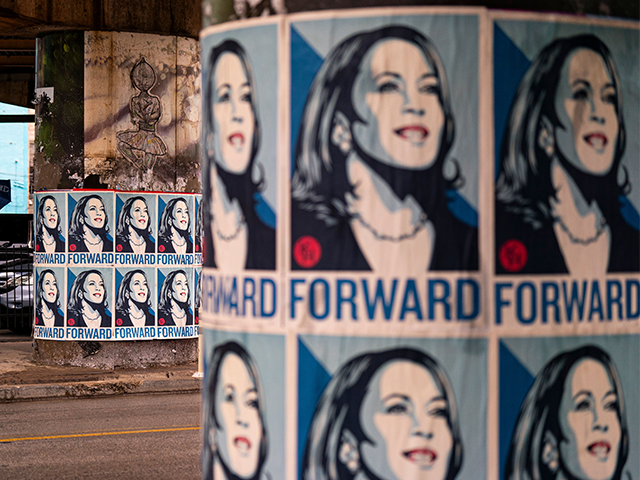Harris Can’t Unburden Herself of the Biden Economy
Kamala Harris appears to have realized that she cannot shrug off the albatross of the Biden-Harris administration’s economic record and must instead defend it.
In her interview yesterday with CNN’s Dana Bash, Harris touted the administration’s jobs records, its legislative achievements, and even took credit for falling inflation. She was not asked, of course, what the administration had done that reduced inflation.
The burden of the Biden-Harris record is heavy. Fifty-two percent of the public say they disapprove of Biden’s job performance when it comes to economic issues, including 40 percent who strongly disapprove, according to the latest polling by YouGov for the Economist. The approving caucus amounts to just 39 percent of registered voters, with a mere 19 percent strongly approving.
Fifty-two percent of registered voters also say that they think the economy is getting worse and a slight 21 percent say it is getting better. Forty-three percent say they are worse off now than they were a year ago, versus just 16 percent who say they are better off.
Harris was one of the biggest cheerleaders for the administration’s economic policies, even going so far as to use the term “Bidenomics” as a positive description. “Bidenomics is working,” Harris said in speeches around the country. And, of course, she provided the key tie-breaking vote for each of the defining pieces of legislation that built the Biden-Harris economy.
Harris’s Campaign of Deceit
Although she avoided using the term “Bidenomics” in her CNN interview on Thursday night, Harris endeavored with all she had to defend the administration’s policies. What she had, however, was mostly bunk. She once again misleadingly claimed that the economy has added 800,000 new manufacturing jobs, a claim now even more dubious after the Bureau of Labor Statistics said earlier this month that it was going to probably take down the estimate of manufacturing payrolls by nearly 100,000 jobs.
She also once again repeated the “original sin” of the Biden-Harris administration: the lie that the economy was in ruins when it took office in 2021. Biden began incanting this falsehood on the campaign trail in 2020, and it was aided by complicit and incompetent establishment media figures. For example, Chris Cuomo, then a CNN anchor, falsely claimed that the U.S. economy was ailing more than Germany’s either because Cuomo did not understand the official government numbers or because he didn’t care to.
But let’s not pick on Cuomo. MSNBC’s Brian Williams, also now a former anchor who was at MSNBC in 2020, also lied about the state of the economy in 2020, although whether this was due to knowing deceit, reckless ignorance, or unyielding incompetence no mortal shall ever know. If we had the patience, we could probably spend the entirety of this edition of Breitbart Business Digest pointing out examples of television anchors, newspaper reports, and pundits spreading lies about the state of the economy in 2020.
Unfortunately, media complicity when it comes to this particular lie is not merely part of the historical record; it is an ongoing scandal for the American press. In last night’s interview, CNN’s Dana Bash raised no objections to Harris’s false characterization of the economy. The coverage in papers such as the New York Times and the Washington Post also failed to take note of Harris’s lie. For a media that is seemingly obsessed with real-time fact checks of every utterance of Trump and JD Vance, this is an embarrassing oversight.
The Road to the White House Could Be Paved with Falsehoods
We wish we were more confident that a campaign based on bunk would fail. But history overflows with examples of mendacity defeating competence. While Trump still enjoys a lead over Harris in most polls when it comes to the economy, that lead is narrowing. A poll taken for Reuters between August 23 and 25 found that Trump had just a three point lead on the economy, down from 11 points a month earlier.
Consumer sentiment survey results released Friday by the University of Michigan show an explosion of hope among Democrats and flagging of optimism among Republicans. The forward-looking index of expectations jumped from 81.7 among Democrats in July to 94.0 in August. Among Republicans, it tumbled to 56.3 from 59.2.
“Democrats exhibited a large 10% increase in sentiment while Republicans posted an equally sized decline. These patterns resulted from a sea change in election expectations this month with Harris emerging as the Democratic candidate for president. In July, 51% of consumers expected Trump to win the election versus 37% for Biden. In August, election expectations flipped; 36% expected Trump to win compared with 54% for Harris,” Joanne Hsu, the director of the survey, said in a statement.

COMMENTS
Please let us know if you're having issues with commenting.